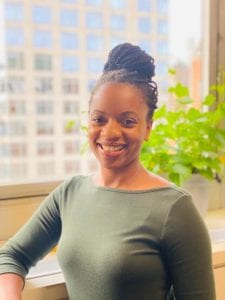I’m Done Wearing a Mask: Part 1 | Renee Cowan, MD, MPH

Renee Cowan, MD, MPH
I am tired of wearing this mask, not the cloth mask that is supposed to protect me and those around me from COVID-19, but the figurative mask that I’ve been wearing for the past 15 years as a Black woman in medicine. I am referring to the mask that covers and shields my Blackness from my colleagues, so they don’t realize I’m different or become uncomfortable by my presence. I am referring to the mask that has me smile and re-introduce myself when, despite my long white coat and the multiple degrees listed on my name badge, I’m mistaken for housekeeping, transport, a patient care technician, or, if I’m lucky, a nurse. I am referring to the mask that allows me to nod and smile when I realize that I’m the only one in the room who has no idea what cultural reference is being made. I am referring to the mask that I don to help me show up to work bright and cheery at 6:00 a.m. the morning after my brother has been arrested for driving through a nice neighborhood in a nice car.
I feel like in the wake of the COVID-19 era, we have been slapped in the face by an even greater and more pervasive pandemic for which there is no vaccination in the works – the pandemic of systemic racial injustice that has been looming in our country and throughout the world for hundreds of years. The protests and apparent disgruntlement of the majority has allowed the collective filter of Black people all over the world to be lifted. Amidst this, I feel like it is now safe, more so necessary, for me to pull down my own mask. While I’ve been living as a minority all my life and undergoing medical training for the past fifteen years, my Blackness has never been more apparent as it has been for the past four months since the murders of George Floyd, Ahmaud Arbery, and Breonna Taylor. I have been approached by numerous colleagues who have trained me or trained with me to find out, “Hey, what do you think about all this? What can I do as a White physician to contribute to this issue?”
Initially, I wanted to shrug it off and say, “you go figure it out.” But in truth, I do have an opinion, one that I’ve been thinking about for fifteen years because I never stopped noticing that, as I progressed through the training stages, mine was the only colored face. I’ve always known that I wanted to take care of little old Black ladies with cancer. I’ve always wanted Black providers to increase in number and contribution, knowing that we were more than capable. I’ve known for a long time that we’ve been understudied and underrepresented on both sides of the table. I’ve always noticed that certain communities have to be served by a higher proportion of community- and foreign-trained providers while the cream of the crop, the AOA, the Top Docs, those trained at prestigious fellowship programs were all reserved for other communities. I’ve had an opinion for a long time about what could be done to help fix healthcare disparities, particularly within our field of Gynecologic Oncology. This work is not just a hot topic for me and others like me. “Disparities” isn’t just a flashy word you put in the title of your paper to guarantee publication, or on your resume to prove your diversity or liberality.
Addressing healthcare disparities is an actual work with a real process. If you’re asking yourself, “What can I do?” look out for Part 2 in next month’s Diversity and Inclusion column.

Renee Cowan, MD, MPH, is a fourth-year gynecologic oncology fellow at Memorial Sloan Kettering Cancer Center in New York City. Prior to fellowship she completed residency in Washington DC at MedStar Washington Hospital Center and medical school at Temple University in Philadelphia, PA.
As researchers, scientists and physicians seek to overcome the barriers that create disparities in the field of gynecologic oncology, Dr. Cowan is part of a research team that is currently conducting a survey to examine the experiences of gynecologic oncologists and explore the role race and ethnicity has played in their professional development. The team is inviting all gynecologic oncologists and trainees of all racial and ethnic backgrounds to complete this survey. This study is being conducted by a team led by Carol Brown, MD, Senior Vice President and Chief Health Equity Officer at Memorial Sloan Kettering Cancer Center (MSKCC). SGO is not involved in the conduct, analysis, or management of any part of this study.